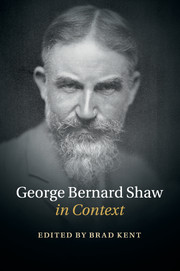Book contents
- Frontmatter
- Dedication
- Contents
- List of illustrations
- Notes on contributors
- Preface
- Acknowledgements
- A Chronology of Shaw's Works
- List of abbreviations
- PART I PEOPLE AND PLACES
- 1 Dublin
- 2 The Fabian Society
- 3 Germany and Austria
- 4 London
- 5 Oscar Wilde
- 6 W. B. Yeats
- PART II THEATRE
- PART III WRITING AND THE ARTS
- PART IV POLITICS
- PART V CULTURE AND SOCIETY
- PART VI RECEPTION AND AFTERLIFE
- Further reading
- Index
- References
2 - The Fabian Society
from PART I - PEOPLE AND PLACES
Published online by Cambridge University Press: 05 October 2015
- Frontmatter
- Dedication
- Contents
- List of illustrations
- Notes on contributors
- Preface
- Acknowledgements
- A Chronology of Shaw's Works
- List of abbreviations
- PART I PEOPLE AND PLACES
- 1 Dublin
- 2 The Fabian Society
- 3 Germany and Austria
- 4 London
- 5 Oscar Wilde
- 6 W. B. Yeats
- PART II THEATRE
- PART III WRITING AND THE ARTS
- PART IV POLITICS
- PART V CULTURE AND SOCIETY
- PART VI RECEPTION AND AFTERLIFE
- Further reading
- Index
- References
Summary
Amidst the squalor of nineteenth-century London, a small group of middle-class intellectuals set about the reconstruction of civilisation. The Fabian Society was far from the only organism to arise from the grime, but unlike some of their revolutionary contemporaries, Fabians were, on the whole, not very interested in getting dirty themselves. Indeed, many were adverse to physical discomfort beyond the hair shirt of their Jaeger woolen suits and the strictures of a vegetarian diet. Bernard Shaw was one such woollener, and with his predilection for cold porridge and his training as a clerk, he was at home amongst the utopians and civil servants who were, in the words of May Morris, ‘gruesomely respectable’.
Fabianism was a set of principles: never a creed and never an ideology, with little policy beyond the society's commitment to gradualism. Fabians sought the practical application of their ideas. Theory was important insofar as it facilitated the transfer of society to socialism, but the Fabians believed that this process was bound to be slow. Fabianism was not revolutionary. The society began amongst a small group of spiritualists and ghost-watchers who, according to their first secretary, Edward Pease, were interested in ‘social as well as psychical progress’. In 1883, the Scottish intellectual Thomas Davidson gave a lecture in London on ‘The New Life’ in which he set out Tolstoyan ideas on clean living. The Fellowship of the New Life, inspired by Davidson's lecture, embraced a communistic vision dedicated to ‘the higher life’ and to providing ‘a worthy education for the young’. Some members, including Edward Pease, envisioned a more practical undertaking than the ‘subordination of material things to the spiritual’, and so Fabianism was slowly born.
The cause of that birth was supplanted by an origin myth brandished on the title page of the first Fabian tract, the reading of which brought Shaw into the Fabian fold. Why are the Many Poor? proclaimed: ‘For the right moment you must wait, as Fabius did most patiently, when warring against Hannibal, though many censured his delays; but when the time comes you must strike hard, as Fabius did, or your waiting will be in vain, and fruitless’. For the Fabians, the moment to strike was perpetually in the future.
- Type
- Chapter
- Information
- George Bernard Shaw in Context , pp. 12 - 20Publisher: Cambridge University PressPrint publication year: 2015



